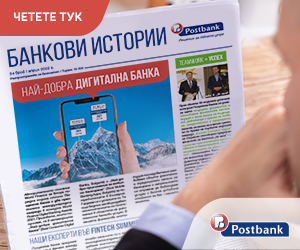Petia Dimitrova: The digital future is now
10 July 2021
Interview with Petia Dimitrova, Chief Executive Officer and Chairperson of the Management Board of Postbank for “24 hours” Newspaper
Petia Dimitrova: The digital future is now
Mrs. Dimitrova, digitalisation and technologies changed the banking sector, which was particularly noticeable during the past year and a half. What did you offer and how did Postbank face the challenges?
Indeed, 2020 posed a lot of challenges before all of us. It was a test to our ability to adequately respond to change, the scale of which was difficult to predict and control. The future of banking is undoubtedly digital, with more advantages, convenience for our clients, ensuring the most important aspect – speed of service, which saves time for the users. The new reality in the banking sector is related to its digitalisation and these are processes which will continue to develop even more profoundly. In 2020 we were prepared and this is why we reacted very quickly and met the expectations of our clients. The proof of the timely decisions we made is demonstrated by the data – for yet another year at Postbank we marked significant increase in the number of clients who choose online banking, and more than 70% of the transactions are now carried out in this way.
Just a few days ago we offered our clients the unique new generation mobile wallet called ONE Wallet, through which users will be able to receive even more banking services via their telephones. Using it they will have immediate contactless access to main banking services as they will transfer their physical wallets to their mobile phones. They will be able to add all of their bank cards to the new wallet and will be able to manage them freely and effectively due to the vast range of functionalities, embedded in the application. Some of these include contactless payment at a POS terminal with the phone, card management in the mobile wallet, such as setting limits to the different channels (POS, ATM, internet payments), possibility to add loyalty cards issued by different traders, discount vouchers issued by our partners and many more.
Our clients will have 24/7 active and flexible control over their funds which is an irreplaceable convenience today. This is why I am convinced that ONE Wallet will become an irreplaceable application in the daily payments for each one of us.
Another significant innovation we implemented at Postbank was the express banking digital zones, which were recognised immediately as a preferred alternative to banking at the counters. Thanks to the intuitive devices installed in these zones our clients are able to execute themselves, faster and easier, most of the main banking transactions, only identifying themselves with a debit or credit card, without having to register for the Bank’s internet banking. Such digital zones function in 64 branches in 32 towns throughout the country and the opening of more locations and expansion of the service is upcoming.
At Postbank we developed and launched another innovative proprietary deposit product – “Structured Deposit Index Climate Change in EUR“, which is oriented to clients looking for additional solutions for their savings. Our newest deposit solution is offered in EUR for a period of 72 months, with guaranteed principal and yield option linked to the performance of an index – Solactive Climate Change Europe BTI PR Index. Compared to the current standard term deposits “Index Climate Change in EUR“ is an alternative investment with an option for yield.
The needs of our clients are a top priority for us and this is why we will continue to offer new solutions for the management of their finances. One of our major goals in this process is to develop high quality products offering the investment security they need.
How did the banking sector perform during this period?
We can definitely say that Bulgarian banks handled this situation very well and they once again demonstrated that they are sustainable and stable institutions. The results show that the banking system suffered minimal stress during this critical period. And although the pandemic has had its impact and although we are all working in an unusual environment with many restrictions, the Bulgarian banking sector continues to be stable, profitable, with high levels of capital adequacy and liquidity.
The fact that a week ago the Bulgarian Credit Rating Agency (BCRA) increased the long-term rating of Postbank from BBB- to BBB, with retained short-term A-3 rating is not an accident. Thus the rating of the Bank was aligned with that of the country, while at the same time the perspective was changed from “positive” to “stable”.
Once again this high assessment of our work is based on the strong operational results and the stable leading position Postbank holds in the banking sector, supported by a number of qualitative and quantitative criteria and indicators.
Life never stops and the clients need support on the spot, not months later. This is why it is very important to be ready and to have ready solutions, which can be offered quickly, so that the users can feel the personalised approach and special attitude. Data confirms that – lending and deposits are up, all systemic banks report profits, and exposures in default decreased last year.
Banks’ revenue is up by approximately 16% during the first quarter of 2021, but this is mainly due to the revenue generated by securities, related to the recovery of the financial markets. Although lending is recovering and banks’ loan portfolios are growing, the strong price competition benefits the clients – banks’ interest income from loans and advances is down by 3% to BGN 744 million during the first quarter of 2021. The first quarter profit of the system is up to approximately BGN 350 million, which creates an additional buffer in case of potential deterioration of the macroeconomic situation.
To us there is no doubt that now, a year and a half later, the trust in the Bulgarian banking system is even stronger. All indications are in place that despite the difficulties we share, it is exactly the banking system that is and will be a major factor during the recovery period.
We are witnessing growth in the fintech sector companies. How will banks demonstrate their competitiveness compared to these companies?
The competition of fintech companies helped us build a successful strategy, relying on our strengths, because our clients do not expect us to be a fintech company, but to be an even better bank.
One of the primary areas, in which we compete, is payments. Fintech companies stormed this market trying to win a market share by waging a pricing war. However, this is a primary business for the banks and their response was to accelerate their digital strategies and solutions, so as to improve and speed up the payments process, as well as to introduce new services, in order to compete effectively.
Currently the focus of our attention is on immediate payments allowing transfer of money to a counterparty in just a few seconds. Postbank, together with BORICA and other local banks, works very hard on the implementation of this product and we expect it to be available to our clients by the end of the year.
While fintech companies are usually focused on one product or service, banks offer complex servicing, combining various services to a full range of clients, while using the possibilities and advantages offered by all channels – both online and offline. In this sense the speed and flexibility offered by fintech companies is not the answer to all expectations and desires of the clients, as for many of them finding a complex solution is important, rather than looking for a provider for each individual service. I am convinced that users will continue to recognise banks as their reliable partner, having the potential to meet their fundamental requirements and constantly building on the customer experience, adding value to the products and services offered. We should not forget that a priceless advantage that will always prevail for banks is the existence of physical locations. This is very important for clients who prefer real, actual human contact, which guarantees the special, personalised attitude they need and rely on when management of their personal finances is in question.
Of course, we cannot deny the dynamic and transformations seen in the sector even before the pandemic hit. Perhaps one of the most important trends we are witnessing is that fintech companies are increasingly moving towards banks, and banks – towards fintech companies. With the expansion of their operations fintech companies are getting to a stage of development where they realise they need a banking license (we have seen many such examples) or they start looking more actively for partnership with banks. On the other hands banks are starting to pay more attention to the customer experience online and they launch entirely digital processes. I believe these are processes the ultimate effect of which will benefit the clients, because in a situation of “a healthy competition” we manage to build on and add value to our products and services.
The pandemic has proven to be a catalyst not only for the digitalisation of banks, but an incentive for the financial literacy of the clients, since it successfully transformed attitudes for the change of which we would normally wait for years otherwise. The months spent in isolation helped many Bulgarians discover the advantages of the digital banking channels and the security with which they can manage their funds online. Of course, this is a process and we expect it to continue, and we will stand by our clients during that time, meeting their specific expectations and needs.
Since we are discussing the topic of technological innovations, new digital currencies are becoming very popular. How is this going to affect banks?
To commercial banks crypto currencies are an area we consider carefully, as we are strongly regulated business and there are many procedures we have to comply with.
Digital currencies are a huge market, but to us the positive aspect would be in the blockchain technology itself, which can be extremely broadly applicable in all sorts of processes within the banking business, such as optimisation, cost cutting and we see a more future in the technology, rather than the crypto currencies themselves.
We should not forget that the topic of an official digital currency is increasingly discussed. The European Central Bank published many statements on the topic, public discussions are currently under way. Let’s see what will be offered first, as what we currently know as an announcement is that this currency would complement standard banknotes, coins and monetary policy.
Do you see a possibility for recovery by the end of 2021 and what would be the direction of such recovery?
We can talk about a positive trend as a whole – for loans, in addition to deposits, data proves that. As at the end of March 2021 gross loans have gone up by 5.3% year-on-year, reaching BGN 70,5 billion. Nominally, the net increase in loans extended only during the first three months of the year approximates BGN 1 billion. The demand for loans by individuals remains high – more than 60% of the funds granted represent new consumer and mortgage loans. And this is a very strong indication as to the positive expectations of individuals and households for the future.
At the same time deposits have hit new record high levels. At the end of March deposits of individuals and businesses exceeded BGN 103.5 billion, whereby just during the first quarter the increase is by BGN 2.9 billion, which is one third of the total increase for the whole, also record setting, 2020. The accumulation of these funds is due to the fact that many companies and households have kept their income during the crisis, but the investment and consumption opportunities during that time were limited.
The postponed consumption may be considered a future incentive for the recovery of the economy, which will undoubtedly happen when the pandemic is handled and people return to their normal pace of life. All analysts forecast strong recovery of the economy in 2021, which will increase consumption as well as demand for loans, which will incentivise companies to invest and restart their investment plans.
Bulgaria joined the Exchange Rate Mechanism ERM II in 2020 and the objective is to adopt the Euro in 2024. Do you think this is realistic and what would be the short-term and mid-term consequences of the accession to ERM II and the adoption of the Euro for the country?
The process of accession of the country to the Eurozone is the most important and fundamental process for Bulgaria over the next few years. This is a historic moment, as for the first time in a decade we have the chance to join the elite economic team of Europe. When we speak of our accession to the Eurozone and the adoption of the Euro as our national currency, I believe we are all looking in the same direction and acting with joined efforts. We have a roadmap in place and all stakeholders involved in this process are extremely active and committed to the ultimate goal.
I do not think there will be big change or long period of adaptation for the Bulgarian public, as one way or another we are used to the Euro as a currency.
Not only the speed of the accession is important to Bulgaria, but also the path followed – it is linked to positive change, unification of the rules and additional transparency. The expectations are that this path will lead to acceleration of the real convergence of the national economy to the Eurozone, more trust by the foreign investors and as a whole – higher economic activity. And this is a plus for the entire public. The accession is also an incentive to implement certain structural reforms, which will lead to better competitiveness of the economy. This is an important prerequisite for the increase in the incomes and more optimism amongst the business and the consumers.
Postbank celebrated its 30th anniversary this year. Please, share your view of the path you travelled together?
I am glad that I witnessed and helped write most of this history, even more in years marked by complicated domestic and international situations, but also marked by landmark success. Over these 30 years Postbank has proven to be one of the most successful banks in Bulgaria, a good partner, employer and socially responsible entity. Furthermore, we established ourselves as an institution that clients trust and which offers them solutions for their tomorrow. The result of this shared trust is that we rank 3rd in terms of loan portfolio and 4th biggest bank in Bulgaria in terms of assets and deposits, holding market share of more than 10%. We have more than 200 branches throughout the country and more than 100 awards for our digital innovation and products, services and social responsibility policy.
This would not have been possible without the efforts of our entire team. Here I would like to thank all of my colleagues, clients, shareholders and the strong international group we are part of.
Once again, the entire team of the bank is behind the digital achievements I was talking about. Therefore we have all the reasons to be proud that they were the ones getting the recognition at the prestigious World Finance Digital Banking Awards 2020 of the highly respected World Finance Magazine. The awards are in the categories “Best Consumer Digital Banks, Bulgaria” and “Best Mobile Banking Apps, Bulgaria”. In the same elite competition for a fourth year running Postbank was winner in the category “Best Retail Bank, Bulgaria”.











